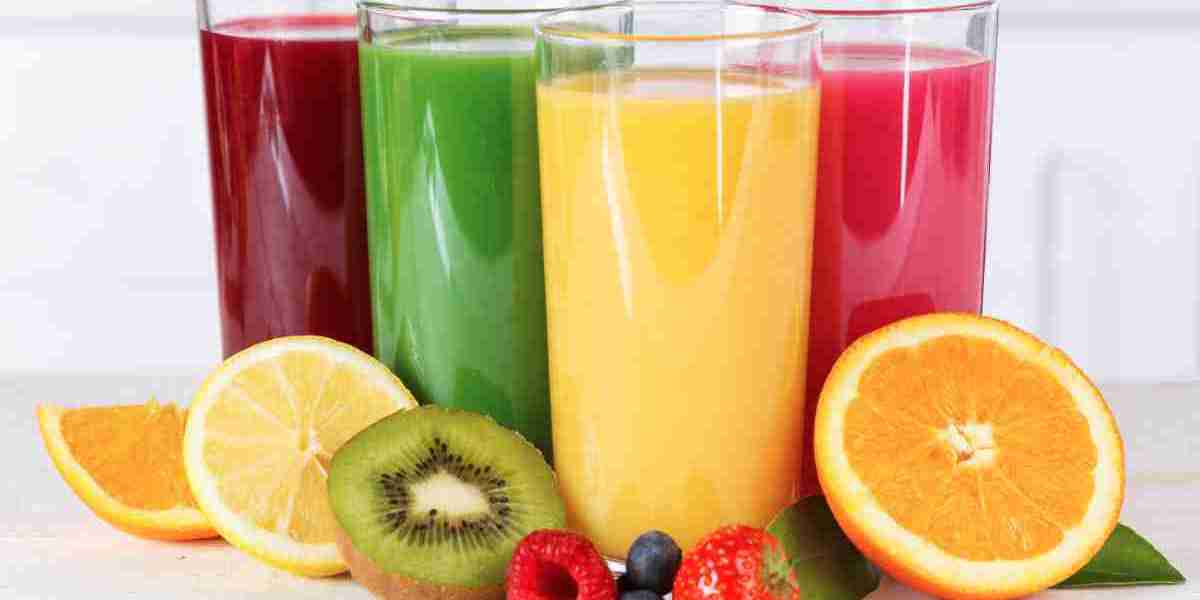The global fruit juice market has evolved significantly in recent years, driven by growing consumer demand for healthier and more nutritious beverages. One of the most notable trends shaping the industry is the rise of functional and fortified juices. These products go beyond basic fruit content to offer additional health benefits, such as enhanced immunity, improved digestion, and better hydration. As health-conscious consumers seek out more targeted nutrition solutions, manufacturers are responding with innovative formulations that cater to this demand.
What Are Functional and Fortified Juices?
Functional and fortified juices are beverages that are enriched with vitamins, minerals, probiotics, antioxidants, and other bioactive compounds. Unlike traditional fruit juices, which primarily serve as a source of natural sugars and vitamins, these enhanced juices aim to provide specific health benefits, making them more appealing to wellness-focused consumers.
Key Components of Functional and Fortified Juices
Vitamins and Minerals – Many fruit juices are fortified with essential vitamins such as Vitamin C, Vitamin D, and B-complex vitamins to boost immunity and energy levels.
Probiotics and Prebiotics – These ingredients support gut health by promoting beneficial bacteria in the digestive system.
Antioxidants – Added antioxidants, such as polyphenols and flavonoids, help combat oxidative stress and reduce the risk of chronic diseases.
Plant-Based Extracts – Ingredients like turmeric, ginger, and green tea extracts are included for their anti-inflammatory and metabolic benefits.
Electrolytes – Fortified juices with electrolytes such as potassium and magnesium aid in hydration and muscle recovery, making them popular among athletes.
Factors Driving the Growth of Functional and Fortified Juices
1. Health and Wellness Trends
The increasing awareness of nutrition and preventive healthcare is driving consumers toward beverages that offer added health benefits. The COVID-19 pandemic further accelerated this trend, with immunity-boosting ingredients gaining significant traction.
2. Demand for Natural and Clean Label Products
Consumers are increasingly seeking clean-label products with natural ingredients, minimal additives, and no artificial preservatives. This has encouraged manufacturers to fortify juices with plant-based nutrients and naturally sourced vitamins.
3. Growing Popularity of Plant-Based Diets
The rise of vegan and plant-based diets has led to a surge in demand for functional juices that offer plant-derived protein, omega-3 fatty acids, and other nutrients traditionally obtained from animal-based sources.
4. Sports and Active Lifestyle Trends
Fortified juices containing protein, electrolytes, and hydration-enhancing ingredients are gaining popularity among fitness enthusiasts and athletes. These beverages help in post-workout recovery and maintaining optimal hydration levels.
5. Regulatory Support and Industry Innovation
Governments and food safety authorities are increasingly supporting fortification programs to address nutritional deficiencies. This has encouraged brands to develop new functional juice products that align with national and international health guidelines.
Challenges in the Functional and Fortified Juice Market
1. High Production Costs
The addition of specialized nutrients and bioactive ingredients increases production costs, making fortified juices more expensive than regular fruit juices.
2. Taste and Consumer Acceptance
Some functional ingredients, such as certain plant extracts and probiotics, may alter the taste and texture of juices, which can be a barrier to consumer acceptance.
3. Regulatory Compliance
Manufacturers must adhere to strict regulations regarding health claims, ingredient safety, and nutritional labeling to ensure consumer protection and avoid misleading marketing.
4. Short Shelf Life
Since many functional juices avoid artificial preservatives, they tend to have a shorter shelf life, requiring proper storage and distribution strategies.
Future Outlook
The future of functional and fortified juices looks promising, with continued advancements in food science and nutrition. As consumers demand more personalized health solutions, we can expect further innovations such as:
Customized nutrient blends tailored to specific health needs (e.g., juices for heart health, cognitive function, or stress reduction).
Sustainable and organic formulations with environmentally friendly packaging.
Enhanced bioavailability of nutrients using nanotechnology and encapsulation techniques.
Conclusion
The rise of functional and fortified juices is transforming the fruit juice market, catering to the evolving needs of health-conscious consumers. By offering enhanced nutrition and targeted health benefits, these products are not only gaining popularity but also setting new industry standards. While challenges such as cost, taste, and regulation exist, ongoing innovations and consumer demand will continue to drive the expansion of this dynamic sector. As the market evolves, functional and fortified juices will likely become a staple in the modern health-conscious diet, providing a convenient and enjoyable way to support overall well-being.




